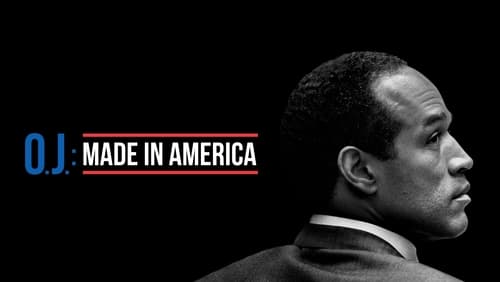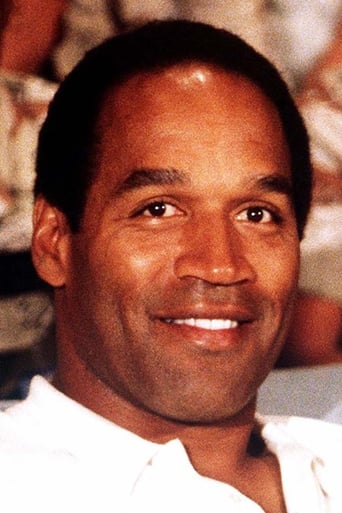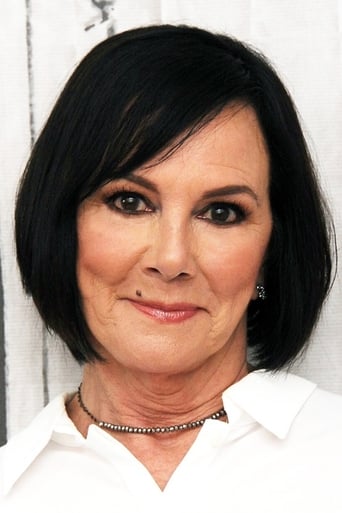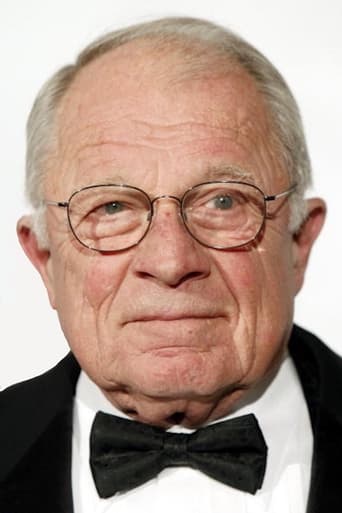Supelice
Dreadfully Boring
Kamila Bell
This is a coming of age storyline that you've seen in one form or another for decades. It takes a truly unique voice to make yet another one worth watching.
Payno
I think this is a new genre that they're all sort of working their way through it and haven't got all the kinks worked out yet but it's a genre that works for me.
Geraldine
The story, direction, characters, and writing/dialogue is akin to taking a tranquilizer shot to the neck, but everything else was so well done.
851222
Greetings from Lithuania."O.J.: Made in America" (2016) was without a doubt one of the very best documentaries I've ever seen, maybe even actually the best one - and i saw a few to say the least. Although i do not live in America, i knew about some of these events before seen "O.J.: Made in America" (2016). It did not surprise me that at the end of this amazing documentary i end up almost seemingly seen a chapter from America's history, because it took for this series almost 8 hours to do it. What i was surprised about is that i couldn't imagine at the beginning that it was going to be done so convincingly great and crystal clear. "O.J.: Made in America" features 5 episodes that all runs for almost 8 hours. But let this not scare you if kinda thinking to see it - i can't remember when the last time i was so absorb when watching a documentary. "O.J" himself is shown here at center of events. Basically it is a biopic about his life, but at the same time if features events in Los Angeles that were surrounding him before and at the time of his (in)famous case. And all of this was shown in a very crystal clear fashion - i literally couldn't put this series down until its final frame.Overall, "O.J.: Made in America" is magnificent look at the America's history. At the center of the event is "O.J." himself and its a fascinating look at the true American tragedy as one person puts it. Definitely one of the very, very best documentaries ever made.
hejonasp
A documentary should be like a silent objective observer, that wants to let the bigger picture paint itself, by including a balanced amount of relevant sources. That is definitely not the case here.This "documentary" doesn't do it's job. It argues O.J. Simpson isn't black enough for there to be any possibility of racist motives about the trial and investigation around him.White old "expert" men tell the story to us viewers, of what the situation of black people in the US were prior to the case with O.J. Simpson. And how we viewers should interpret O.J. in particular. Many of the things these white old men say, are so out there, it's shocking this could even be considered for an Academy Award.It seems the only black people who get to speak, are ones who knew O.J. from his school days, and they barely comment on the case itself.This documentary is quite sloppy constructed from the start, by leaving out so much. We practically learn nothing about O.J.'s life prior to his breakthrough as an American football player. The footage used is very blurred, constantly repeated, and you almost get dizzy trying to keep up as they move back and forth in time. It seems like they had barely no access to footage about O.J., and no intention of telling a story. They rather paint their own story, which has no direct relevance to neither O.J. nor the trial.An agenda would had been perfectly fine though, if it didn't appear to have such obvious preconceived motives. Why didn't they describe Nicole more and her background? Why didn't they tell this story from a woman's perspective, who was beaten by her husband? It takes a long time before they even mention her at all.This entire "documentary" is highly embarrassing. It fails in editing, and even in building up sympathies for the agendas it has. It's rather a political statement that doesn't care for a second what O.J. did and did not do. Rather whether he is black enough to justify calling anyone a racist.
vostf
I couldn't wait to watch this acclaimed documentary since I had only a superficial understanding of what happened during the 1995 trial. At the time of the resounding 'Not guilty' verdict I remember thinking that in America money could buy you out of prison even with overwhelming evidence against you.Ezra Edelman's documentary brilliantly adds maximum perspective to the original verdict. That OJ Simpson was, at heart, a man from the ghetto who would talk himself out of most situations (even if that meant leaving his buddies behind to save his neck) and as a man who reneged on his roots to enjoy the high life as the equal to other affluent (white) people. This last point is essential since this makes playing the 'race card' during the criminal trial even more outrageous (if that is indeed possible), but it also explains that the man was so obsessed with his image that he became just a big psychotic narcissist: an affable successful man in public and an extremely insecure (jealous and paranoid towards others but in denial about himself) thus prone to bursts of violent rage in his private life.The documentary also does a great job of describing the history of LAPD abuses against minorities. Simpson's defence posse eventually tried to connect this ugly context with the criminal case. Actually it was enough for the jury (already prejudiced in favour of Simpson) to think there was at least a reasonable doubt that all the evidence pointing at OJ's unmistakable guilt was not reliable. Which is silly because the defence strategy was about describing a litany of hypothetical doubts, not proving any actual weaknesses in the prosecutor's case, and wrap it under the argument that the LAPD has a history of gross misconduct against black people.As good as the documentary is presenting the facts, giving us a fascinating insight into the so-called "Trial of the Century", I felt I lacked something. I mean the 'Non-Guilty' verdict is even more disturbing after this comprehensive review. You just cannot believe that the "race card" just won the case. So I went on the read Vincent Bugliosi analysis of the trial (Outrage, the 5 reasons why OJ Simpson got away with murder) and I was thus able to link the dots: the prosecution fumbled his way through a truckload of sound evidence (plus another mountain of circumstantial evidence). You actually have a hint of this in Made in America: Christopher Darden is presented giving in to the defence tease to have Simpson try the gloves on. But for the most part direct testimony from Marcia Clark weights in on the overall 'Fatality thesis': this case was doomed from the start for the DA's office. It's like bad things happened for the poor prosecuting team (there were 2 dozens attorneys working the case !) but they had no way of preventing it or making up for the lost ground...I understand it is difficult to line up witnesses to sit in front of the camera and kind of stab them in the back by pointing the finger at them. I understand the focus of the documentary cannot be lost on a deep analysis of the trial yet there lacks one essential commentary at some point between the 5th and 7th hour of the storytelling. More precisely it seems strange that Mark Fuhrman is left alone defending himself for what happened when the prosecutors dumped him like a pestiferous witness in 1995, and with Marcia Clark continuing to blame him 20 years after (despite her dismal work in court she earned millions to write her whining account).
tomgillespie2002
On June 12th, 1994, Nicole Brown Simpson, the ex-wife of lauded American football player and all-round superstar O.J. Simpson, was murdered, along with her friend Ron Goldman. Both were stabbed multiple times, with Nicole's injuries so severe that her head was almost completely severed from her body. The crime scene was appalling and was clearly the aftermath of a frenzied attack, with all evidence pointing to O.J.. What followed was truly the biggest media sensation of our time; a circus in the ugliest sense of the word which divided America between blacks and whites. The case continues to fascinate, and despite the many documentaries covering the trial, Ezra Edelman's O.J.: Made in America finds new ground to cover, interviewing practically anyone caught up in the trial and juxtaposing O.J.'s story with that of the horror of growing up black in Los Angeles.Released as a five-part mini-series on ESPN for their 30 to 30 series, Made in America also made a limited appearance on cinema screen, and received its premiere at the Sundance Film Festival. Controversially, this qualified it as a feature and for the Best Documentary Academy Award (which it won), and watched as a whole the film runs at a whopping 7 hours plus. But anyone who states it was undeserved needs to watch the film again, as this is about as detailed, powerful and utterly gripping as documentary film-making gets. It seems to cover just about every angle, bringing in anybody who was anybody in the events leading up to the murder and the aftermath for revealing interviews, as well as boasting a stunning collection of archive footage. It's meticulously researched stuff, and even if you know the long-studied case back to front, you will still find something new. Starting way back, we are taken through O.J.'s rise as a star college football player, leaping over or barging through anybody who stood in his way. He was worshipped almost like a God, and took this success to an unhappy period as a professional playing in Buffalo, where he was away from the glitz and glamour of Hollywood. We move through his tearful retirement to his move into acting, where he appeared in the likes of Capricorn One (1977) and The Naked Gun (1988), and his successful run as the face of Hertz. There's also his initially sweeping love affair with a beautiful young blonde named Nicole Brown, before the reports of domestic violence began. We witness a black man becoming a superstar in a white world that falsely preached equality, and he sat comfortably in that world while his fellow African- Americans were suffering terrible abuse at the hands of the law. Time and time again we witness a black man, woman or child murdered, beaten or treated like a dog by the police, only for them to be acquitted of the crime. Payback, it would seem, was on the cards, as the trial of O.J. Simpson began.We are left in no question as to whether or not O.J. did it. He comes across as a master manipulator, ready to throw anybody under the bus - and have them be grateful at the same time - if it will give him a foot forward. A controlling, egotistical bully who would leave visible prints of his boot on Nicole's face, he is truly the worst kind of scumbag. The outcome of the trial certainly isn't excused (the prosecutor reminds the court late on that nobody seems to remember than Nicole and Ron were the actual victims), but it goes some way to explain it. You can feel the anger brewing as the film goes on, and through some truly disturbing footage of the Rodney King beating and the murder of Latasha Harlin, makes you angry with them. It portrays an entire country divided, with the trial playing out as an obvious metaphor for a nation in complete disarray, while the disgusting flaws in the American Justice System are exposed to a bleary-eyed prosecution. It's a work of true scholarship and unyielding ambition, and a frightening indictment of just how little has changed.





